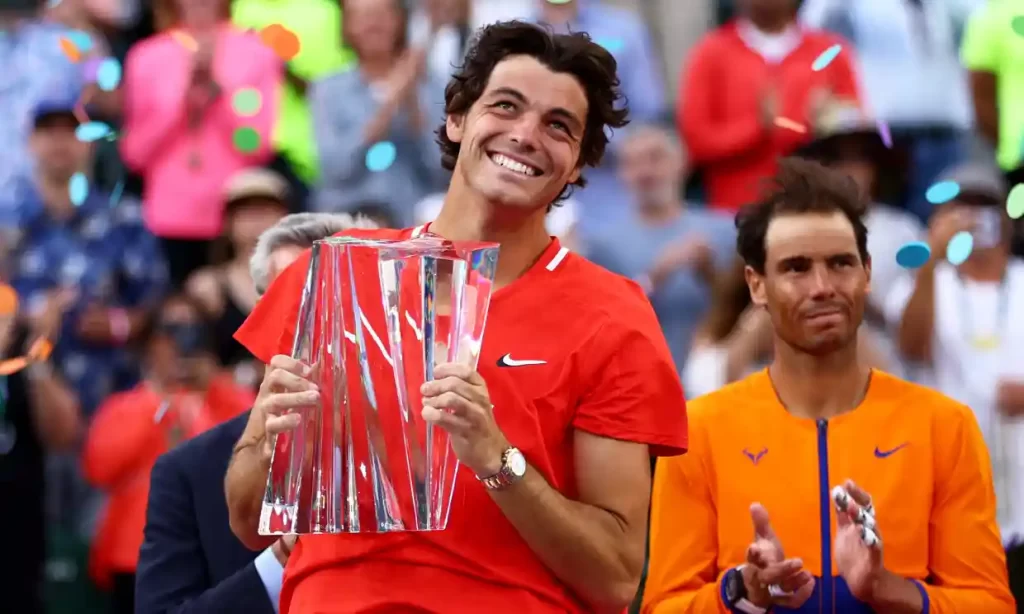As violent winds battered the Californian desert across the weekend, disturbing countless tennis players in its wake, a new American champion emerged from the chaos of the BNP Paribas Open. Taylor Fritz, 24, finished the tournament of his life by holding his nerve in the tightest moments to upset Rafael Nadal 6-3, 7-6(5) and win his first Masters 1000 title in Indian Wells.
In the women’s singles, Iga Swiatek further built on her exceptional start to the season and her profile as the most promising young player today as she defeated Maria Sakkari 6-4, 6-1 to win her second consecutive WTA 1000 title and move to 20-3 (87%) this season.
The build-up to the men’s match had centred around Fritz’s condition after he tweaked his ankle in Saturday’s semi-final and then aborted his practice hours before the biggest match of his life. When he arrived on court, all eyes settled on the blue tape rising up from the white sock on his right foot.
“I went through a rollercoaster of emotions before the match, from thinking ‘there’s no way I could possibly play’, then doing so much work on the ankle, then going out, hitting on one of the back courts, all of a sudden thinking: ‘oh my god maybe I can play’,” said Fritz.
But instead of hobbling around the court, Fritz rose to the moment. He opened the match attacking relentlessly off both wings, unloaded on forehands whenever the opportunity presented itself and combined with seamless serving to quickly establish a 4-0, double-break lead.
While he played tremendously well, with every passing game, attention shifted from his own injury to the ailment across the net that played an even greater role in the match. Nadal had issues with his left chest area in his spectacular semi-final match against Spain’s Carlos Alcaraz. Against Fritz, his service speeds had fallen off a cliff, he winced when lunging to retrieve forehands and he offered minimal resistance to the American’s barrage.
But in the second set, after a medical timeout, Nadal fought with everything he had and he stood on the verge of pushing Fritz into a nervous third set numerous times. But through all the obstacles that followed, from an early break for Nadal, to multiple long, tight service games, a squandered championship point and then an impossibly tight tiebreak, Fritz overcame each in turn to seal the match of his life.
Fritz, one of a number of talented American players around his age growing steadily if not spectacularly, has been one of the most improved players in recent months. His rise began at the winter edition of Indian Wells in October when he reached the semi-final, and he has since compiled a 5-3 record against top 10 players, moving from 39th in October to his pre-tournament career high of 16.
He will now leave Indian Wells as the world No 13 and, most importantly, a Masters 1000 champion: “Winning this tournament especially, Indian Wells, this is one of those childhood dreams that you just never even think could come true,” said Fritz, who is from California. “I just keep saying ‘no, no, just no way it’s real.’”
After his greatest ever start to a season, a spotless 20-match winning streak with three titles, including the Australian Open, and a final, Nadal’s great run comes to an end. Having already withdrawn from the Miami Open, he will now return to Spain in order to recover and prepare for an imminent clay court season. Few will look forward to facing him there.
For Swiatek, an 11th match win in succession marked another crucial step up in her career as she continues to distance herself from the rest of her contemporaries as the biggest talent of her generation. After blitzing the field to shock French Open in 2020 aged 19 and an extremely solid sophomore season inside the top 10, she has started this year by taking her growth to hard courts.
Swiatek has now won the first two WTA 1000 titles of the year, Doha and Indian Wells, in addition to a hard-fought semi-final run at the Australian Open. Mentally, she has become comfortable as a top player and she is ready to push for more. She is quietly building her well-rounded game, moving forward to the net more, incorporating more variety into her game while also pushing herself to play with a far more attacking mindset, looking to bully opponents with her vast weaponry and then making the adjustments as matches go on.
The final itself was volatile due to the wind, with countless breaks and swings in momentum in the opening set. But Swiatek managed her nerves far better than Sakkari and she attacked through the wind with greater margin and intelligence. She completed her first big title with just five games lost which, incredibly, is the joint most she has conceded in her four one-sided big finals.
While Swiatek leaves as the new world number two, right on track as she looks to further fulfil her incredible potential across all surfaces, she is still learning the full breadth of her powers: “It’s pretty crazy because I wasn’t expecting to be in that place, honestly, especially after playing so well in previous tournaments,” she said. “I didn’t know it’s possible for me to play this well and [for] this long.”
Source: The Guardian


